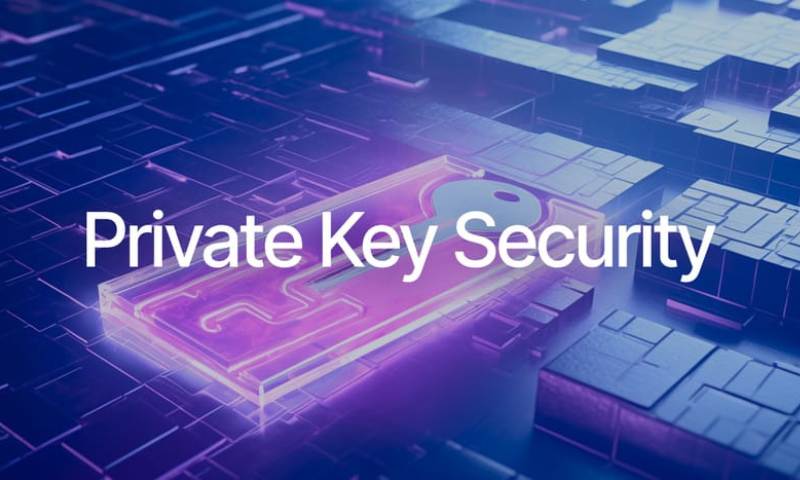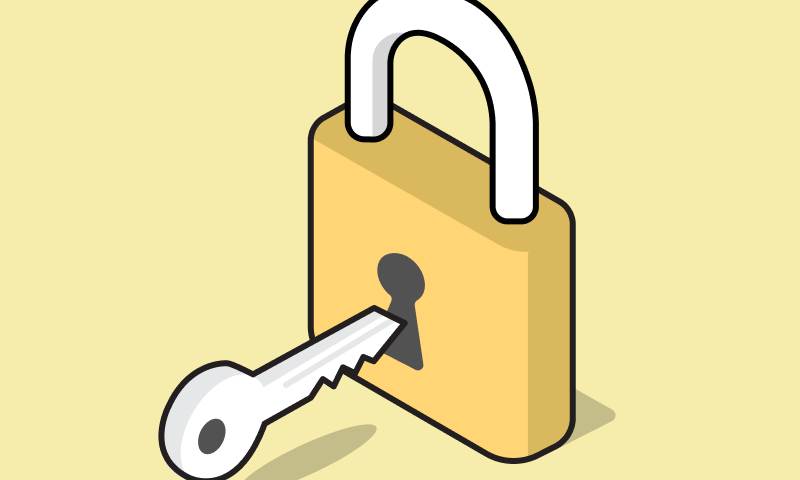How to secure private keys—it sounds like a tough puzzle, doesn’t it? It’s not just about having a tough password. It’s the shield guarding your digital gold. As your cyber-safety coach, I’m here to gear you up against those sneaky digital thieves. Think of private keys like the master key to your online treasure chest—cryptocurrency. If that key gets swiped, kiss your digital coins goodbye. So, what’s a crypto owner to do? Lock it up tight, that’s what! We’ll start with the basics of crypto asset safety, then dive into the best ways to keep your keys far from prying eyes. Ready to become a Fort Knox? Great, let’s unlock the vault of knowledge!
Understanding Cryptocurrency Asset Security
The Role of Private Keys in Cryptocurrency Security
Private keys are like the secret codes to your digital funds. They unlock access to your cryptocurrency, making them super important for security. A strong private key keeps hackers away from your coins.
Comprehending Digital Wallet Security Risks
Digital wallets store private keys, holding your crypto secure. But they face threats like hacking and scams. Staying alert helps in protecting cryptocurrency assets. Keep digital wallet security in your mind always.
When it comes to the safety of your cryptocurrency, knowing how to keep private keys secure is crucial. If your private key is stolen, so are your assets. It’s like giving a thief the keys to your safe. So, what must you do to ensure the safety of your keys? Let’s dive in and talk about the best methods.
Use Strong Passphrases
First up, make your passphrase a tough nut to crack. It should be a long mix of letters, numbers, and symbols. Think of it as a super-strong password. This phrase unlocks your private key, so make it hard to guess.
Update Regularly
Keep your software up-to-date. This step includes your digital wallet app and any security programs you run. Cyber crooks often exploit old software. By updating, you close these doors and keep your assets safe.
Go Cold with Storage
Use cold storage for your keys. That means keeping them offline, away from hackers’ reach. It’s like storing your jewels in a safe, not on your kitchen table.
Back It Up
Backup your keys. Imagine losing your phone and your digital wallet with it. A backup helps you recover your digital cash without sweat. Use several spots to store backups, like USB drives and even paper.
Lock It Up
Physical security is also key. Treat your digital keys like gold. Keep them in a locked drawer or safe when not in use.
Learn and Teach
Educate yourself and others about key security. The more you know, the safer you stay. Learn about risks like phishing, where scammers trick you into giving up keys. Teach your friends about these too.
Multi-Factor Checks
Use multi-factor authentication whenever you can. This method asks for several proofs of identity before access. It could be a password and a text code. This makes it super tough for anyone but you to get in.
Keep a Sharp Eye
Watch out for keylogging. It’s when nasty software records your keystrokes. Make sure to check your devices and use trusted keyboards only.
By following these steps, you’re building a fortress around your cryptocurrency. Each layer of security—from strong passphrases to multi-factor checks—adds strength. Remember, in the world of crypto, the one holding the keys rules the castle. Keep your keys guarded like a treasure, and never share them. Your digital wealth depends on it. Stay smart, stay updated, and keep those keys under lock and key.
Best Practices for Enhancing Private Key Security
Utilizing Encryption Techniques for Safeguarding Keys
Keys lock up your digital coins. To keep them safe, we use encryption. This is like a secret code that shields your keys from thieves. Think of it as a fortress for your digital cash. Only the right code lets you in. For the highest safety, you should use the toughest codes out there.
Encryption scrambles your private keys. This turns them into puzzles. Only with the right key can the puzzle be solved. This way, even if someone gets your encrypted key, they can’t use it. It’s like a locked box with a lost key. Useless to finders.
Use strong encryption for your keys. Aim for algorithms like AES. They are tested and hard to crack. Always keep your software updated. Old programs might have holes that let hackers slip through. Just as you want the strongest lock for your home, you want the strongest encryption for your keys.
Multi-Factor Authentication and Its Importance
Think of your digital wallet like your home. Would you use only one lock? No! For better safety, you would have a few. This is what multi-factor authentication does for your wallet. It adds more locks. It takes at least two proofs from you to get to your assets. This can be something you know, like a password. It can also be something you have, like your phone, or even something you are, like your fingerprint.
By using multi-factor, you make your wallet way tougher to break into. If a thief gets your password, they still need your phone, which they likely don’t have. So, your assets stay safe.
Always turn on multi-factor when you can. It’s an easy step but adds a ton of safety. Teach friends and family to do it too. The more people use it, the safer everyone’s money is. Preventing theft begins with such simple steps. Multi-factor is a key one.
Keep in mind, all these tips are for nothing if you’re not careful. Be smart online. Watch out for fishy emails or messages. These might try to trick you into giving away your keys. Never share your keys. Think of them like the key to your heart – super private!
Remember to always use safe nets when you’re dealing with keys. Use a secure internet connection. Avoid public Wi-Fi for any wallet business. Keep your antivirus on and your eyes open for any strange keyboard activity. This might mean someone is tracking your keys.
In crypto, staying secure is ongoing. Just like we update our phones, we need to keep our security fresh. Always learn and adapt. This way, we keep our digital treasures locked up tight.
Advanced Key Management and Backup Strategies
Cold Storage Solutions: What Are They and When to Use Them
Cold storage is like a safe for your digital gold. It’s keeping your crypto keys offline. You should use it to protect them from online thieves. It means moving private keys off the network. This stops hackers who can’t touch what’s not there.
Here’s how cold storage ups your game:
- Hardware wallets: Small devices that hold keys securely. Think of a USB stick, but smarter and safer.
- Paper wallets: Your keys get printed on paper. No online hacker can reach this.
- Safety deposit boxes: Place your hardware or paper wallet in a bank’s box. Here, physical keys meet physical locks.
- Sound wallets: Store your private key in sound waves. Yes, it’s a thing, and it works like magic.
Using cold storage is wise when you have a lot of coins. Or when you don’t trade every day. Keep those keys locked away, safe from sneaky online eyes.
Crafting Strong Passphrases and Secure Backup Protocols
To keep crypto keys safe, make strong passphrases. A passphrase is a set of words you can remember. But it’s not just any words. Make them random and long. Mix in numbers and symbols too. It should be something hard to guess, like a riddle!
Write down your passphrase. Keep it where only you can find it.
Backups are your plan B if things go south. It’s making copies of your crypto keys. Here’s how to do it right:
- Multiple places: Don’t put all eggs in one basket. Spread out your backup copies.
- Regular updates: Change your backups when you make new keys or wallets.
- Safe formats: Use USB sticks, CDs, or even printouts. Keep them away from prying eyes.
Let friends or family know about your backup methods. But only if you trust them like you trust in gravity.
Remember, when you’re protecting cryptocurrency assets, think ahead. Always keep the keys to your digital kingdom under your firm control. Use these tips to shore up your walls against the endless tides of cyber threats.
Staying Secure in an Evolving Digital Landscape
Educating on the Risks: Phishing, Keylogging, and Software Vulnerabilities
Keeping keys safe is crucial. You must know about phishing, keylogging, and software flaws. Phishing tricks you into giving your keys to thieves. They pretend to be trusted folks or firms. Don’t click strange links or give keys to anyone. Keylogging is a nasty software that steals what you type, like keys. Always check for this risk and use anti-virus tools to keep safe. Software vulnerabilities can let hackers in. Keep your software up to date to block these holes.
Protect your keys like treasure. Use strong passwords nobody can guess. Turn on multi-factor authentication (MFA). This adds a step to check it’s really you. Use different forms of ID, not just a password. It’s a strong shield against thieves. You can also use physical keys for offline storage. They’re called hardware wallets. Hardware wallets keep keys out of hacker reach.
The Continuous Process of Updating Security Practices
Security never sleeps. Thieves get craftier daily. We must get better at protecting our keys too. Change your habits often. Switch up passwords. Double-check the sites where you enter your key info. Make sure you trust them.
Back your keys up safely. Have more than one copy. Store them in places you can lock, like safes or locked drawers. Think of backup like an emergency kit. It’s there when trouble hits. Always have a plan B. Know how to get your keys back if you lose them.
Keeping up is tough, but stay strong. Read about new threats and how to beat them. Talk to experts. Learn and share key safety tips. We can all help each other stay safe. Together, we make a hard wall for thieves to break through.
Stay sharp, friends. The fight to keep keys safe is on every day. We’re all in this together!
In this blog, we dug into how to keep your crypto safe. We learned that private keys are your main guard. They’re like secret codes that let you use your crypto. But thieves can be smart. That’s why you gotta know about digital wallet dangers. We then talked about making your keys even safer. We said encryption is like a super lock. And multi-factor authentication—think of it as your crypto’s bodyguard.
Next, we covered top-notch key care. Cold storage is like a high-tech safe. And making a very tricky passphrase is like having a strong fence. We need to keep our backups safe too.
Lastly, we talked about not getting tricked. We learned we must always stay sharp. Hackers keep coming up with new tricks. We have to keep updating how we protect our keys.
So stay alert, keep your crypto’s defenses up, and never stop learning. Be safe out there!
Q&A :
How can I ensure the security of my private keys?
Ensuring the security of private keys is critical for protecting sensitive information and access to digital assets. One of the best practices to secure private keys includes using strong, unique passwords and changing them regularly. Additionally, storing private keys in encrypted form, either on a hardware device like a USB or a hardware wallet specifically designed for cryptocurrency, can provide an extra layer of security. It’s also important to keep the keys offline as much as possible and make secure backups in multiple locations.
What are the risks of mishandling private keys?
Mishandling private keys can lead to a number of risks including unauthorized access to your digital assets, identity theft, financial loss, and even permanent loss of assets if the keys are lost or destroyed. Since the private key is essentially the “password” to access and control assets, if it’s compromised, it can give attackers the same access and control as the rightful owner.
What is the best practice for storing private keys offline?
The best practice for storing private keys offline—often referred to as “cold storage”—is to use a paper wallet or a hardware wallet. Paper wallets involve printing out the private keys and public addresses and storing them in a secure location. Hardware wallets are physical devices that store private keys securely and ensure transactions can only be signed offline, greatly reducing the risk of hacking.
How often should I back up my private keys?
You should back up your private keys whenever you create a new one or whenever you make a significant change to your wallet or assets. It’s also wise to perform routine backups to ensure that any changes are reflected. Make sure that backups are kept in secure locations and consider using different media types to store the backups, such as USB drives, CDs, or even paper.
Can two-factor authentication (2FA) be used to protect private keys?
Yes, two-factor authentication (2FA) can be added as an additional layer of security when handling private keys, especially for online wallets or services. While 2FA doesn’t protect the private key itself, it does protect the access to the wallet or service where the private key is used. This means that even if a password is compromised, the attacker would still need the second factor—usually a code sent to a mobile device or generated by a hardware token—to gain access.


